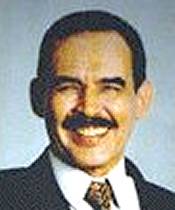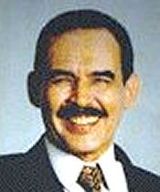
The first fully democratic Presidential election since 1960 occurred on 11 March 2007. The election was the final transfer from military to civilian rule following the military coup in 2005. This was the first time the president was selected by ballot in the country's history. The election was won by Sidi Ould Cheikh Abdallahi, who was ousted by a military coup in 2008 and replaced by general Mohamed Ould Abdel Aziz.

Prior to the coup d'état of August 2005, Mauritania was a one party dominant state with the Democratic and Social Republican Party in power. Opposition parties were allowed, but widely considered to have no real chance of gaining power.

A Mauritanian presidential election occurred on 11 March 2007. Since no candidate received a majority of the votes, a second round was held on 25 March between the top two candidates, Sidi Ould Cheikh Abdallahi and Ahmed Ould Daddah. Abdallahi won the second round with about 53% of the vote and took office in April.
Ahmed Ould Daddah is a Mauritanian economist, politician and civil servant. He is a half-brother of Moktar Ould Daddah, the first President of Mauritania, and belongs to the Marabout Ouled Birri tribe. He is currently the President of the Rally of Democratic Forces (RFD) and was designated as the official leader of the opposition following the 2007 presidential election, in which he placed second.
Ibrahima Moctar Sarr is a Mauritanian journalist and politician of the fulani patrilineage Saar. Running as an independent, he placed fifth in the March 2007 presidential election, and he has been the President of the Alliance for Justice and Democracy/Movement for Renewal (AJD/MR) since August 2007.
The People's Progressive Alliance is a political party in Mauritania.

General elections were held in Ghana on 7 December 2008. Since no candidate received more than 50% of the votes, a run-off election was held on 28 December 2008 between the two candidates who received the most votes, Nana Akufo-Addo and John Atta Mills. Mills was certified as the victor in the run-off election on January 3, 2009, by a margin of less than one percent. It is to date the closest election in Ghanaian history.

Mohamed Ould Abdel Aziz is a Mauritanian politician who is currently the President of Mauritania, in office since 2009. A career soldier and high-ranking officer, he was a leading figure in the August 2005 coup that deposed President Maaouya Ould Sid'Ahmed Taya, and in August 2008 he led another coup, which toppled President Sidi Ould Cheikh Abdallahi. Following the 2008 coup, Abdel Aziz became President of the High Council of State as part of what was described as a political transition leading to a new election. He resigned from that post in April 2009 in order to stand as a candidate in the July 2009 presidential election, which he won. He was sworn in on 5 August 2009.

A presidential election was held in Mauritania on 18 July 2009. Mohamed Ould Abdel Aziz, who led the 2008 coup d'état, won a narrow first-round majority in the election, according to official results. A second round, if necessary, would have been held on 1 August 2009.
The Alliance for Justice and Democracy/Movement for Renewal is a political party in Mauritania. It represents the black minority population of the south of the country, centered on the Senegal River valley, and was formed and is led by rights activist and former presidential candidate Ibrahima Moctar Sarr. The party's colours are black and white, and its symbol is a Zebu bull, livestock being associated with the traditionally pastoralist Fula people who make up much of its constituency.

Presidential elections were held in Mauritania on 12 December 1997. Incumbent President Maaouya Ould Sid'Ahmed Taya won the election with 91% of the vote. Voter turnout was 74.7%.

Presidential elections were held for the first time in Mauritania in August 1961 to elect the President for the next five years. Moktar Ould Daddah, who had been acting head of state since independence from France in 1960 was the only candidate, and was elected unopposed. Although he was a member of the ruling Mauritanian Regroupment Party, his candidacy was also supported by the Mauritanian National Union. Voter turnout was 93.6%.

Presidential elections were held in Mauritania on 7 August 1966. Following the merger of all the country's political parties into the Mauritanian People's Party (PPM), the country had become a one-party state in December 1961. Its leader, incumbent President Moktar Ould Daddah, was the only candidate, and was re-elected unopposed. Voter turnout was 96.2%.

General elections were held in Mauritania on 8 August 1971 to elect a President and National Assembly, the first time the two elections had been held together. At the time, the country was a one-party state with the Mauritanian People's Party (PPM) as the sole legal party. Its leader, incumbent President Moktar Ould Daddah, was the only candidate in the presidential election, and was re-elected unopposed to a third term in office, whilst the PPM won all 50 seats in the National Assembly election. Voter turnout for the parliamentary election was reported to be 95.6%.

General elections were held in Mauritania on 8 August 1976 to elect a President and National Assembly. At the time, the country was a one-party state with the Mauritanian People's Party (PPM) as the sole legal party. Its leader, incumbent President Moktar Ould Daddah, was the only candidate in the presidential election, and was re-elected unopposed, whilst the PPM won all the seats in the National Assembly election. Voter turnout was 97.9%. They were the last elections held until the restoration of multi-party democracy in 1992.

Presidential elections were held in Mauritania on 21 June 2014, with a second round planned for 5 July if no candidate received more than 50% of the vote. The result was a first round victory for incumbent President Mohamed Ould Abdel Aziz of the Union for the Republic, who received 82% of the vote. Most of the opposition parties boycotted the election.

El Wiam is a centrist political party in Mauritania led by Boïdiel Ould Houmeit. It is made up mainly of ex-officials from the regime of Maaouiya Ould Taya.








